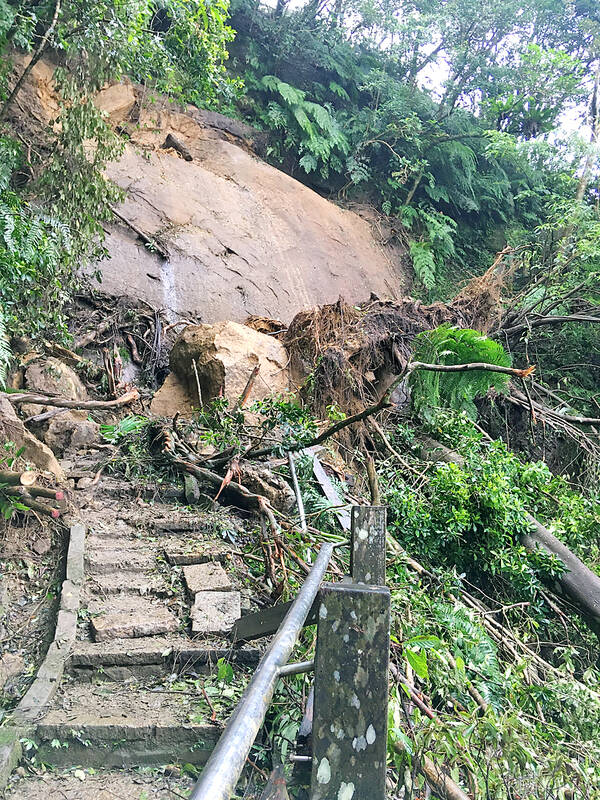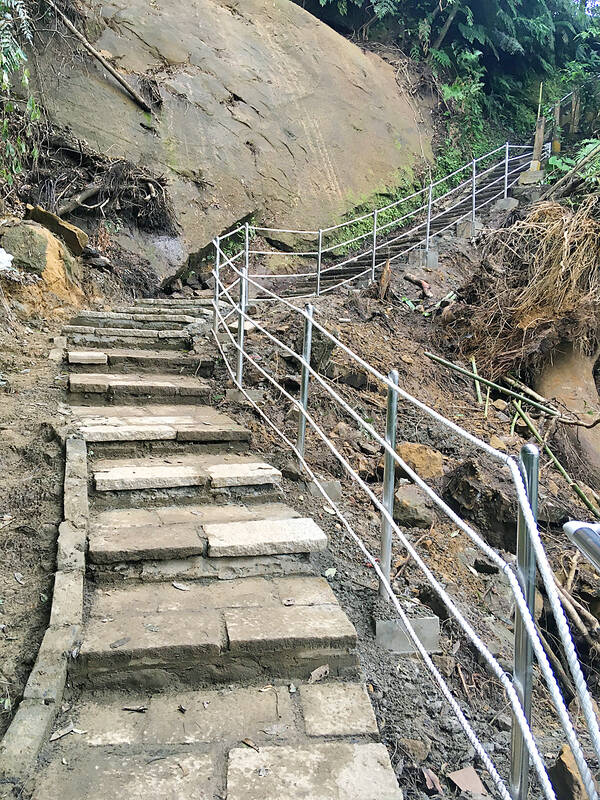All hiking trails damaged by Typhoon Kong-rey have been repaired and has reopened for people who want a refreshing hike in Taipei during the Lunar New Year holiday, a city official said.
The Taipei Basin is known for its easily accessible hiking trails. It has more than 130 trails combined into the 92km-long Taipei Grand Trail, which was divided into seven major routes when it was launched by the Taipei City Government in 2018.
Last year, a part of the sixth route of the Grand Trail collapsed due to Typhoon Kong-rey, which hit Taiwan in October. The damaged section belongs to one of the most trodden hiking trails in the city, as it connects the Elephant Mountain trail near Xiangshan MRT Station (象山站) to Jiuwu Peak (九五峰), a popular destination for photography.

Photo: Esme Yeh, Taipei Times
Chu Chien-an (儲健安), chief of the Hiking Trail Subdivision at the Geotechnical Engineering Office of the Public Works Department, on Jan. 7 told the Taipei Times that there are a total of 154 hiking trails managed by the Taipei City Government.
The typhoon brought down up to 330 trees onto the city’s hiking trails, with the one blocking the section between Thumb Mountain (拇指山) and Jiuwu Peak, he said.
“A Taiwan acacia rooted in a huge rock fell down onto the trail and crushed the pavement bricks and guard rails, bringing lots of soil and stones that blocked the section,” Chu said.

Photo: Esme Yeh, Taipei Times
“The most challenging part of the repair was the removal of the huge rock. The engineering contractor brought a generator, a crusher and power saws to the site to break it down. Sometimes, we had to carry diesel up there to replenish the machines’ tank. It took about 45 minutes to transport these tools and other materials from the hill foot to the site,” he said.
“The fallen tree and rock damaged the pavement and guard rails, but the trail’s underlying structure remained intact. So everything was easier when the rock was removed,” Chu added.
Of all fallen tree damages caused by the typhoon, that section was the worst case and was resolved last, he said.
“Most fallen trees were cleared from the trails by Nov. 10, but the one blocking the section wasn’t cleared until Nov. 12,” Chu said.
“The reconstruction of the pavement and rails was completed on Dec. 25, with minor reinforcements to be added in the future. People can hike on the trail as usual,” he said.
A woman selling cold beverages at Lingyun Temple (靈雲宮) said the regular entrance to the Elephant Mountain trail was blocked after the typhoon due to fallen trees.
Some visitors would take another route via the temple to continue their hike, but those who did not know the alternative route would leave, she said.
A tree had fallen onto the temple’s roof and more fell on the trail, but the authorities did not start the work there immediately, as they were busy with post-typhoon cleanups elsewhere and needed time to process requests that were flooding in, the woman said.
“Thanks to the trail’s volunteers, most of the fallen trees on the trail were quickly removed,” she said.
Larger trees such as the one on the temple’s roof still requires help from the government, she added.
A trail hiker surnamed Wang (王) said he visits the trail and its branches at least twice a week.
“It’s a 20-minute bike ride from my place around the Renai Road to the entrance of the Elephant Mountain trail,” he said.
Asked whether his hikes were affected by fallen trees or the blockade, Wang said he visited the trail less often, but did not give up the habit, taking alternative routes instead.
“To climb up Jiuwu Peak, there are two other routes that do not have to bypass the south summit of the Nangang Mountain (南港山). However, they can be more dangerous during rainy days, as they are not official trails paved with bricks,” he said.
The blockade did not last long, as volunteers helped clear up blockages while the authorities were unavailable, he added.
“The authorities promptly came and inspected the damage the day after the typhoon was gone, although they needed time to initiate the repair process. I have seen many volunteers cleaning fallen leaves and using saws to cut off small fallen trees, and most of them were local residents,” Wang said.
Wang also said there are a lot of fireflies along the trail to Jiuwu Peak from April to May, especially at the section without streetlights.
“Most people would visit the nearby Tiger Mountain to see fireflies, as it is more famous, but actually the Elephant Mountain trail has more fireflies. Most of them would linger along the section without streetlights, and volunteers would cover streetlights with lampshades to create a more firefly-friendly environment,” he said.
“Come visit the trail in April or May, stroll along the stone pavement toward Jiuwu Peak, and you’ll see lots of fireflies sparkling around you,” Wang said.

“China is preparing to invade Taiwan,” Deputy Minister of Foreign Affairs Francois Wu (吳志中) said in an exclusive interview with British media channel Sky News for a special report titled, “Is Taiwan ready for a Chinese invasion?” the Ministry of Foreign Affairs said today in a statement. The 25-minute-long special report by Helen Ann-Smith released yesterday saw Sky News travel to Penghu, Taoyuan and Taipei to discuss the possibility of a Chinese invasion and how Taiwan is preparing for an attack. The film observed emergency response drills, interviewed baseball fans at the Taipei Dome on their views of US President

ECONOMIC BENEFITS: The imports from Belize would replace those from Honduras, whose shrimp exports have dropped 67 percent since cutting ties in 2023 Maintaining ties with Taiwan has economic benefits, Ministry of Foreign Affairs officials said yesterday, citing the approval of frozen whiteleg shrimp imports from Belize by the Food and Drug Administration (FDA) as an example. The FDA on Wednesday approved the tariff-free imports from Belize after the whiteleg shrimp passed the Systematic Inspection of Imported Food, which would continue to boost mutual trade, the ministry said. Taiwan’s annual consumption of whiteleg shrimps stands at 30,000 tonnes, far exceeding domestic production, the ministry said. Taiwan used to fill the gap by importing shrimps from Honduras, but purchases slumped after Tegucigalpa severed diplomatic ties with Taiwan

The Executive Yuan yesterday approved a southwestern extension of the Sanying MRT Line from New Taipei to Bade District (八德) in Taoyuan, with a goal of starting construction by late 2026. The 4.03-kilometer extension, featuring three new stations, will run from the current terminus at Yingtao Fude Station (LB12) in New Taipei City to Dannan Station (LB14), where it will connect with Taoyuan’s Green Line, New Taipei City Metro Corp said in a statement. This extension will follow the completion of core Sanying Line, a 14.29-kilometer medium-capacity system linking Tucheng (土城), Sansia (三峽)

CARGO LOSS: About 50 containers at the stern of the ‘Ever Lunar’ cargo ship went overboard, prompting the temporary closure of the port and disrupting operations Evergreen Marine Corp, Taiwan’s largest container shipper, yesterday said that all crew members aboard the Ever Lunar (長月) were safe after dozens of containers fell overboard off the coast of Peru the previous day. The incident occurred at 9:40am on Friday as the Ever Lunar was anchored and waiting to enter the Port of Callao when it suddenly experienced severe rolling, Evergreen said in a statement. The rolling, which caused the containers to fall, might have been caused by factors including a tsunami triggered by an earthquake in Russia, poor winter sea conditions in South America or a sudden influx of waves,